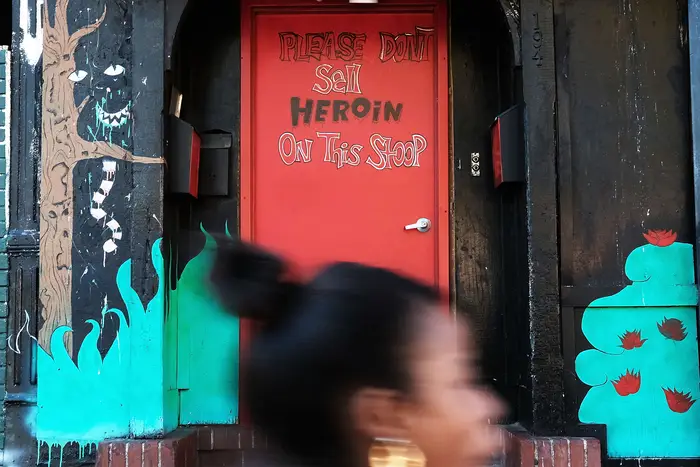Technology
Staten Island’s Innovative Program Cuts Drug Overdose Deaths by Nearly 50%

A new outreach initiative in Staten Island, known as “hotspotting,” has significantly reduced drug overdose deaths in the borough. The program, which launched in 2022, employs a combination of data analysis, artificial intelligence, and personal outreach to assist individuals at the highest risk of overdose. Early results show that the number of overdose deaths per 100,000 residents fell by nearly 50% in 2023, compared to 28% citywide, according to a recent report from the city health department.
Matt Germoso, a peer recovery advocate at Staten Island University Hospital, plays a critical role in this initiative. He approaches individuals potentially at risk without directly mentioning substance use. Instead, he discusses various social services he can connect them to, tailoring the conversation to their specific needs. Germoso’s own experience with addiction provides him with a unique perspective and empathy in these outreach efforts.
The hotspotting program utilizes an AI-driven algorithm developed through a partnership between MIT and local health care providers. This technology identifies individuals most likely to overdose based on multiple factors, including medical history and legal involvement. Referrals can also come from the district attorney’s office and various health organizations. Once individuals are identified, peers with similar experiences reach out to assess their needs, whether for housing, treatment, or access to Narcan, a medication that can reverse opioid overdoses.
The program has engaged over 600 drug users since its inception. From April 2022 to April 2024, the program reported that four participants died of overdoses, a stark contrast to the 25 deaths recorded in a control group. Furthermore, there has been a notable decline in emergency room visits among participants, suggesting that the proactive support provided is effective in addressing immediate health needs.
Despite the positive outcomes, researchers continue to explore the reasons behind the overall decline in overdose deaths across the United States. Many agree that investments in harm reduction programs, like hotspotting, contribute significantly to these improvements. Joseph Conte, executive director of the Staten Island Performing Provider System, referred to the proactive outreach as a “paradigm shift” for the community.
Challenges remain, particularly in Staten Island, where many residents experience greater isolation from available services compared to other boroughs. Donna Demarest, the director of harm reduction at Community Health Action of Staten Island, noted that while the island’s insular nature poses difficulties, it also facilitates collaboration among various organizations working towards common goals.
As the program continues to show promise, plans for expansion are underway. Earlier this year, NYC Health and Hospitals announced it would implement a pilot version of hotspotting at Lincoln Hospital in the Bronx, which currently has the highest overdose death rate in the city. This initiative will receive $600,000 in funding from the Robin Hood Foundation.
Overall, Staten Island’s hotspotting program exemplifies how innovative approaches, combining technology with personal outreach, can effectively address the pressing issue of drug overdose deaths in communities. The continued focus on identifying and supporting those at risk holds the potential for further reductions in overdose fatalities in the future.
-

 Science1 month ago
Science1 month agoNostradamus’ 2026 Predictions: Star Death and Dark Events Loom
-

 Technology2 months ago
Technology2 months agoOpenAI to Implement Age Verification for ChatGPT by December 2025
-

 Technology7 months ago
Technology7 months agoDiscover the Top 10 Calorie Counting Apps of 2025
-

 Health5 months ago
Health5 months agoBella Hadid Shares Health Update After Treatment for Lyme Disease
-

 Health5 months ago
Health5 months agoAnalysts Project Stronger Growth for Apple’s iPhone 17 Lineup
-

 Technology5 months ago
Technology5 months agoElectric Moto Influencer Surronster Arrested in Tijuana
-

 Education5 months ago
Education5 months agoHarvard Secures Court Victory Over Federal Funding Cuts
-

 Health5 months ago
Health5 months agoErin Bates Shares Recovery Update Following Sepsis Complications
-

 Technology6 months ago
Technology6 months agoDiscover How to Reverse Image Search Using ChatGPT Effortlessly
-

 Technology7 months ago
Technology7 months agoMeta Initiates $60B AI Data Center Expansion, Starting in Ohio
-

 Science4 months ago
Science4 months agoStarship V3 Set for 2026 Launch After Successful Final Test of Version 2
-

 Technology7 months ago
Technology7 months agoRecovering a Suspended TikTok Account: A Step-by-Step Guide





















